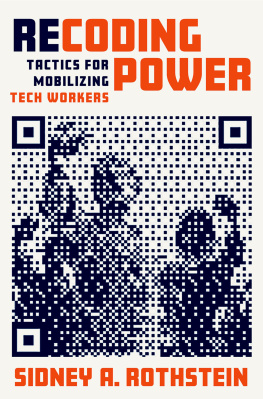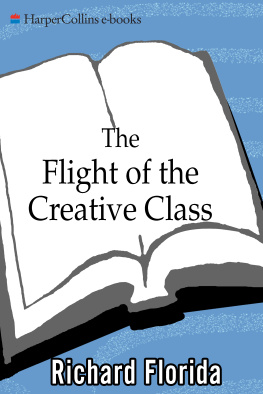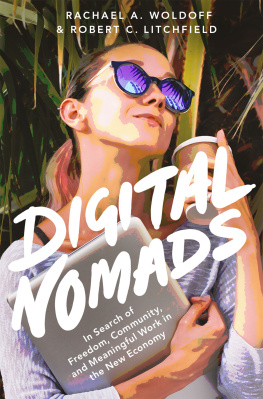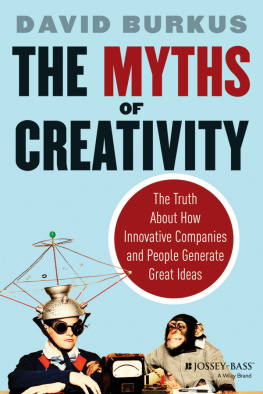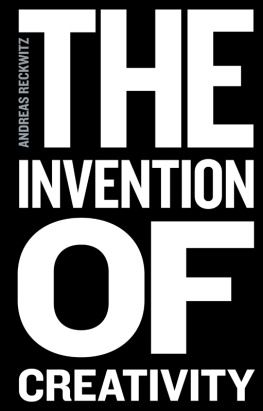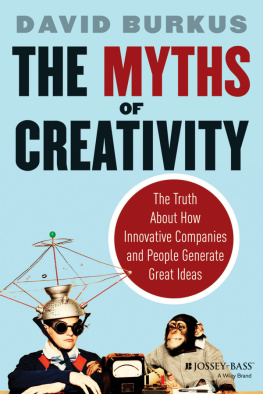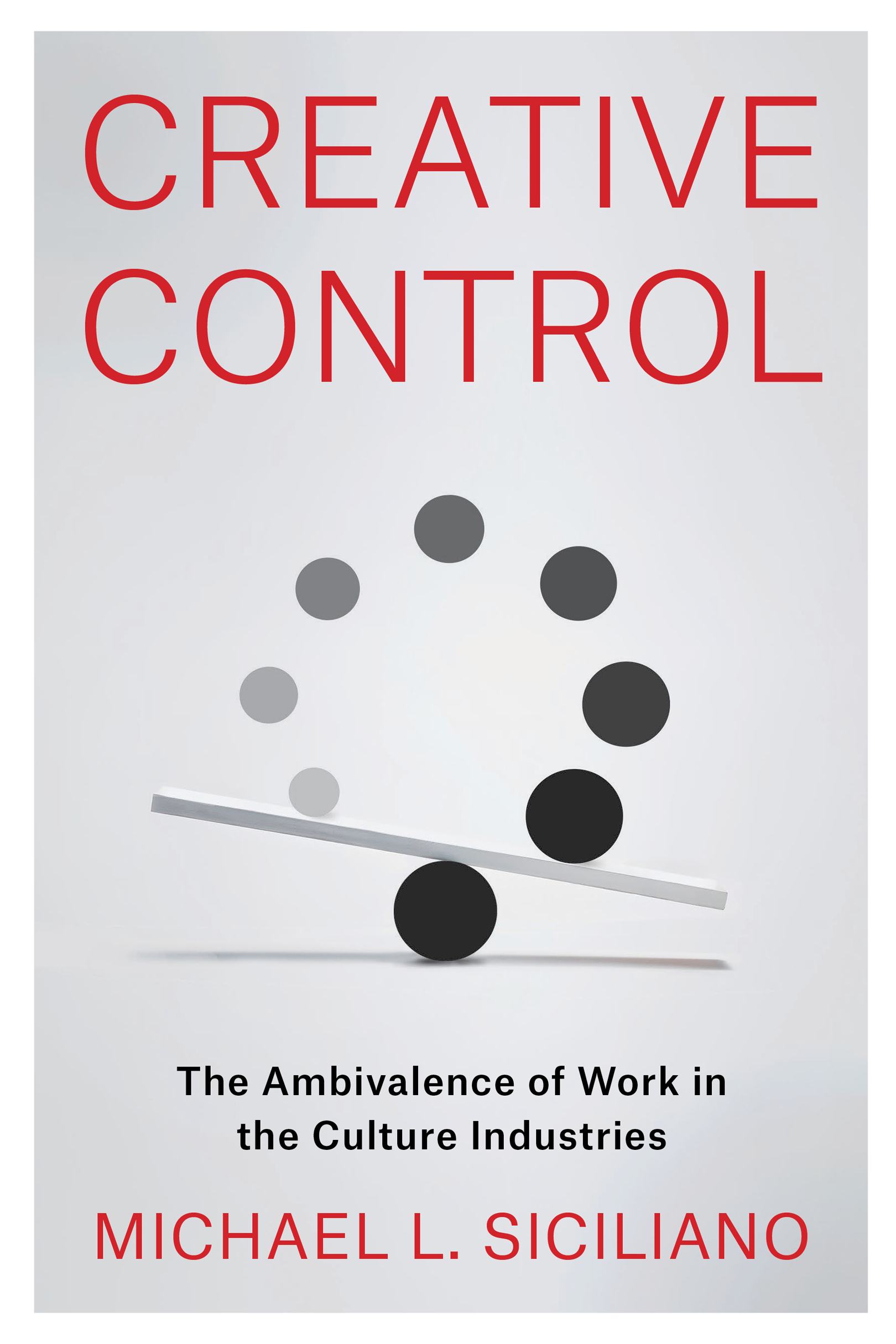Michael L. Siciliano
Names: Siciliano, Michael L., author.
Title: Creative control : the ambivalence of work in the culture industries / Michael L. Siciliano.
Description: New York : Columbia University Press, [2021] | Includes bibliographical references and index.
Identifiers: LCCN 2020045830 (print) | LCCN 2020045831 (ebook) | ISBN 9780231193801 (hardback ; alk. paper) | ISBN 9780231193818 (trade paperback ; alk. paper)
Subjects: LCSH: Cultural industries. | Creative ability. | Creative ability in business. | WorkPsychological aspects.
Classification: LCC HD9999.C9472 S525 2021 (print) | LCC HD9999.C9472 (ebook) | DDC 658.3/14dc23
A Columbia University Press E-book.
CUP would be pleased to hear about your reading experience with this e-book at .
The production of a book, like any cultural product, is an immensely social process involving many people, all equally important. Sociologists have known this for quite some time, yet most studies of cultural production focus on only the most visible, most obviously important contributors to the production of knowledge, information, media, and the arts. Among my many aims with this book, I hope to correct the absence of routine workers in studies of media and the arts by including both expressive and routine forms of work in this ethnography of creative labor. With that in mind, I want to begin by thanking all the people whom I met while conducting ethnographic fieldwork for this book. All the people involved with the recording studio that I call SoniCo as well as the freelance recording engineers and the many YouTube creators who invited me into their workplaces and homes were incredibly generous with their time and candid with their opinions. This book could not have been written without their valuable contributions to my research project and my life.
I also, like a ghost, owe much to my haunts where I did much of the writing for this book, and so I would like to acknowledge the importance of cafes in Los Angeles; the East Bay; Kingston, Ontario; Pittsburgh, Pennsylvania; and Steubenville, Ohio. Even though they may never read this, I would like to extend a big thank you to the many baristas who served me countless cups of black coffee while I wrote. These unsung heroes include the bean slingers of Stories, Chango (RIP), and Cafecito Organico in Los Angeles; Lili (RIP) in Pittsburgh; Leonardos in Steubenville; and the Elm in Kingston. Though I mostly wrote in these places, it also felt a bit like ongoing fieldwork as I watched people use Slack to chat with their coworkers, share their latest PowerPoint decks via Dropbox, or use their laptop to work on their latest mix of a song for some geographically distant client. Even after I left the offices at SoniCo and The Future, I was still surrounded by their modes of work whenever I decided to plunk away at my computers keys in public.
This book would not be possible without Ching Kwan Lee, whom I thank for her robust and ceaseless support as well as rigorous criticism. I owe her much for her years of mentorship, a debt that I cannot begin to repay. While others might have reined me in, attempting to fit a square peg in a round hole, she gave me a rather long leash during the early stages of this project. I would also like to thank Edward Walker, Stefan Bargheer, and Christopher Kelty at UCLA. I do not think I would be the scholar I am today without their support and guidance.
Early drafts of several chapters benefited from thoughtful feedback provided by Joan Donovan and other participants in Chris Keltys Part.Lab as well as by the UCLA Sociology Departments working groups in Ethnography and Movements, Organizations, and Markets, which were headed by Kyle Nelson and Lina Stepick. Likewise, Nina Eliasophs Politics, Organizations, Ethnography, and Theory (POETs) and Paul Lichtermans Ethnography of Public Life (EPL) working groups provided me with an important social and intellectual anchor during my time as a postdoctoral scholar in the Department of Sociology at the University of Southern California. Thoughtful comments and collegiality from Thomas Abrams, Martin Hand, Annette Burfoot, and all my colleagues at Queens University provided much needed positivity during the final stages of writing in the coldest months of my first Canadian winter.
I thank my good friends for their continued friendship, reading of early drafts, and providing positivity during my fieldwork and writing. I was always excited to have Pat Reilly show up at my door while in Los Angeles to discuss sociology, records, and comedy over coffee and lunch. Although Steven Tuttle resides in Chicago, he never felt far away as he offered thoughtful comments on my work and continued emotional support, providing a friendship that I highly value. Alexandra Lippmans invitation to participate in her Sound Ethnography Project opened me up to the incorporation of sound recordings in my fieldwork while also introducing me to sound studies, STS, and incredible friends such as Nalika Gajaweera, a familiar face who made USC less intimidating, and Alessandro Delfanti, with whom I continue an ongoing discussion about the future of labor. I also want to thank Neil Gong and Brooks Ambrose for their patience when we lived together and for their continued support of my research. I miss the countless hours we spent in traffic talking about social theory and research methods. I thank Wisam Alshaibi for being supportive and generous with his time, offering both commentary on my research as well as superb drumming for some of my more recent creative pursuits. I also want to thank my good friends Ashton Leech, Frank Fornsaglio, and Jeff Gentle for sharing their perspectives on work with me and for letting me bounce ideas off them. I also want to thank my mother and my family for offering their support in the ways they know how.
This project benefited from funding generously provided by the National Science Foundation (Grant Number 1636662) and from time spent discussing my work with Melissa Gregg, Hannah Landecker, Gabriel Rossman, David Halle, Zsuzsa Berend, and William Mazzarella, whose course Commodity Aesthetics at the University of Chicago left a lasting mark on my thinking, making a starting point for this project.
I would like to thank Eric Schwartz and the editorial board at Columbia University Press for taking on my project and providing guidance through the publishing process. This project also benefited from three anonymous reviewers who provided thoughtful comments on earlier drafts. Portions of appear in a significantly truncated form as an article in Organization Studies published in 2016.
Last but not least, I thank my ever-inspiring partner, my love, Ariel Pittman, for attempting to keep me sane during the final year of writing this book and for sharing her experiences as someone in a creative career. I finished this during the COVID-19 pandemic, and walking with Ariel around our neighborhood in Los Angeles and taking trips to the beach (staying inside the car the whole time of course) eased some of the anxieties brought out by 2020s perpetual crises. I will forever cherish all those times she convinced me that yes, it was OK to take a break from this book to go for a walk outside.


